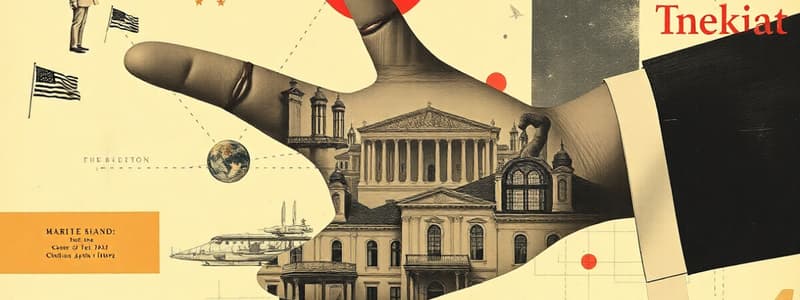Podcast
Questions and Answers
What is implied by resource scarcity in relation to goods?
What is implied by resource scarcity in relation to goods?
- All goods will always be abundant.
- A rationing mechanism is required. (correct)
- Goods are distributed equally.
- Scarcity can be ignored.
Which concept does Adam Smith develop in his work?
Which concept does Adam Smith develop in his work?
- The Invisible Hand of government.
- Government control in market dynamics.
- Control through social forces.
- The concept of Spontaneous Order. (correct)
What best summarizes the overall principle of the Invisible Hand theory?
What best summarizes the overall principle of the Invisible Hand theory?
- It requires strict governmental oversight.
- Markets channel individual self-interest for the social good. (correct)
- Social forces hinder individual self-interest.
- It has no relation to economic performance.
Which of the following best describes the role of the market system?
Which of the following best describes the role of the market system?
How are the wages of welders primarily determined in the United States?
How are the wages of welders primarily determined in the United States?
Which of the following is NOT an aspect of Spontaneous Order?
Which of the following is NOT an aspect of Spontaneous Order?
What is considered a rational choice for an individual regarding opportunity cost?
What is considered a rational choice for an individual regarding opportunity cost?
Which of the following economic questions is irrelevant to all societies?
Which of the following economic questions is irrelevant to all societies?
What framework does Professor Bowles suggest enhances educational success?
What framework does Professor Bowles suggest enhances educational success?
Which factors are associated with Adam Smith's ideas in Wealth of Nations?
Which factors are associated with Adam Smith's ideas in Wealth of Nations?
What generally occurs in a society of individuals left alone to follow the economic decision rule?
What generally occurs in a society of individuals left alone to follow the economic decision rule?
What assumption does the economic decision rule depend on?
What assumption does the economic decision rule depend on?
What is a key assumption of the Invisible Hand Theorem?
What is a key assumption of the Invisible Hand Theorem?
What did Adam Smith believe about a market-based economic system?
What did Adam Smith believe about a market-based economic system?
What argument is presented in Adam Smith’s book, The Wealth of Nations?
What argument is presented in Adam Smith’s book, The Wealth of Nations?
According to the Invisible Hand Theorem, the market system will produce which of the following?
According to the Invisible Hand Theorem, the market system will produce which of the following?
Which outcome does the Invisible Hand Theorem guarantee regarding market production?
Which outcome does the Invisible Hand Theorem guarantee regarding market production?
What is a conclusion about resource allocation according to the Invisible Hand Theorem?
What is a conclusion about resource allocation according to the Invisible Hand Theorem?
Flashcards are hidden until you start studying
Study Notes
The Invisible Hand & The Market System
- Adam Smith, in his book "The Wealth of Nations", argued that a market-based economic system is superior to Mercantilism for maximizing national wealth.
- According to the Invisible Hand Theorem, the market system, driven by individual self-interest, produces goods efficiently and allocates resources based on demand.
- The Invisible Hand Theorem depends on the assumptions that individuals are rational and act primarily out of self-interest.
- The market system relies on prices to ration goods, making it a "price system".
- The concept of Spontaneous Order, closely associated with Adam Smith, highlights how complex social systems can emerge organically from the actions of individuals, without centralized planning.
Economic Decision Rule
- In a society where individuals are left to follow an economic decision rule based on self-interest, it generally leads to the correct answers for "what to produce" and "how to produce", but may not distribute income equally.
Rational Decision Making
- Economists assume that individuals make rational decisions based on maximizing their own benefits.
- A rational individual chooses the option with the highest benefit, considering the opportunity cost of each choice.
### Economic Questions
- Societies face three fundamental economic questions:
- What to produce?
- How to produce?
- Who gets what is produced?
- The market system primarily addresses these questions through individual decision-making, resource allocation, and price signals.
Studying That Suits You
Use AI to generate personalized quizzes and flashcards to suit your learning preferences.




